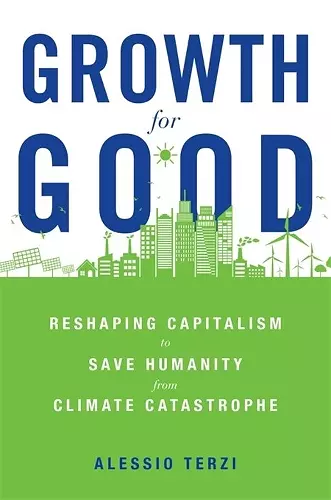Growth for Good
Reshaping Capitalism to Save Humanity from Climate Catastrophe
Format:Hardback
Publisher:Harvard University Press
Published:27th May '22
Should be back in stock very soon

A Foreign Affairs Best Book of the Year
From the front lines of economics and policymaking, a compelling case that economic growth is a force for good and a blueprint for enrolling it in the fight against climate change.
Economic growth is wrecking the planet. It’s the engine driving climate change, pollution, and the shrinking of natural spaces. To save the environment, will we have to shrink the economy? Might this even lead to a better society, especially in rich nations, helping us break free from a pointless obsession with material wealth that only benefits the few? Alessio Terzi takes these legitimate questions as a starting point for a riveting journey into the socioeconomic, evolutionary, and cultural origins of our need for growth. It’s an imperative, he argues, that we abandon at our own risk.
Terzi ranges across centuries and diverse civilizations to show that focus on economic expansion is deeply interwoven with the human quest for happiness, well-being, and self-determination. Growth, he argues, is underpinned by core principles and dynamics behind the West’s rise to affluence. These include the positivism of the Enlightenment, the acceleration of science and technology and, ultimately, progress itself. Today growth contributes to the stability of liberal democracy, the peaceful conduct of international relations, and the very way our society is organized through capitalism. Abandoning growth would not only prove impractical, but would also sow chaos, exacerbating conflict within and among societies.
This does not mean we have to choose between chaos and environmental destruction. Growth for Good presents a credible agenda to enroll capitalism in the fight against climate catastrophe. With the right policies and the help of engaged citizens, pioneering nations can set in motion a global decarbonization wave and in parallel create good jobs and a better, greener, healthier world.
Calls for an energy transition that doesn’t reject growth but does involve more government support, international coordination and social cohesion to ensure nobody gets left behind. -- Lionel Laurent * Bloomberg *
[This book] shows what is at stake in the debate surrounding the relationship between the economic system and the environment. Policymakers and those working in environmental sociology and economics will find this book particularly fruitful. -- Yusuf Murteza * LSE Review of Books *
Terzi persuasively demonstrates an idealistic argument that the capitalist growth imperative, or market expansion, can be harnessed for good, with the support of governments, international coordination and social cohesion…A welcome addition to the debate on the future of capitalism. -- Kate O'Reilly * International Affairs *
This is an essential book for the students, professionals, and people engaged in the debate around green growth in the context of rising climate-led extreme events…Path-breaking. -- Anjal Prakash * Economic & Political Weekly *
Growth for Good is a thought-provoking state-of-the-art depiction of the cleavages between our economic model, society and the fight against climate change. With his clear and concise analysis, Terzi makes a refreshingly holistic but pragmatic contribution to a debate that is riddled with normative and idealistic theories. Even more importantly, the book provides a tangible agenda for how governments, businesses and citizens can work together to transform capitalism into a force for good. -- Lucas Resenda Carvalho * Progressive Post *
Are capitalism and economic growth the source of humanity’s most pressing problems—climate change in particular—or the solution? Whichever way you come out on this question, this book will be a revelation. Terzi’s optimistic and compelling message is that a green and more equitable future is possible, but only if we remake capitalism as we know it. -- Dani Rodrik, author of The Globalization Paradox
This important book takes the reader on a journey through economic history to conclude that people, planet, and prosperity are not only compatible—they are inseparable. A must-read for policymakers, and anyone interested in fighting climate change. -- Paolo Gentiloni, European Commissioner for Economy and former Prime Minister of Italy
This book is an extremely readable guide as to both why we need to treat climate change so much more seriously as well as why such a path might deliver better sustainable and fairer economic growth.
-- Jim O’Neill, Member of the House of Lords of the United KingdomA spirited defense (against degrowthers) of the need for growth…Growth for Good does an excellent job of pointing out the silences and the inconsistencies in degrowth arguments. -- Diane Coyle * Enlightened Economist *
Terzi thoughtfully engages with the ‘degrowth movement’…Although he acknowledges the urgent need to attend to climate change and income inequality, he makes the case that only the resources made available by an expanding market economy will suffice to address these problems. -- Barry Eichengreen * Foreign Affairs *
Growth for Good is thought-provoking and important, and builds a compelling case by linking the literature on economic growth, inequality, and climate change. I hope this book reaches the hands of economic advisors of key politicians and persuades them to embrace the future. -- Roger Fouquet, editor of Handbook on Green Growth
Drawing knowledge from economic history and beyond, Alessio Terzi passionately argues that economic growth can and should be made compatible with a greener future for our planet and that capitalism can become a precious ally to this end. A must-read. -- Sascha O. Becker, Monash University
- Short-listed for Project Syndicate Sustainability Book Award 2023 (United States)
ISBN: 9780674258426
Dimensions: unknown
Weight: unknown
368 pages